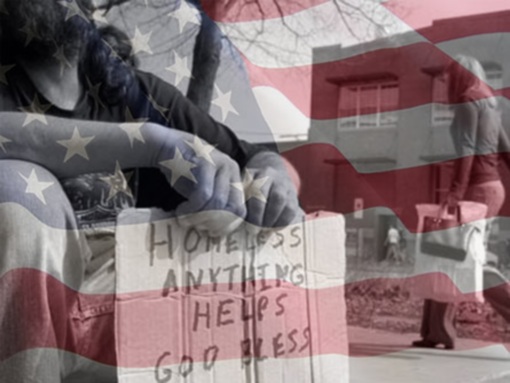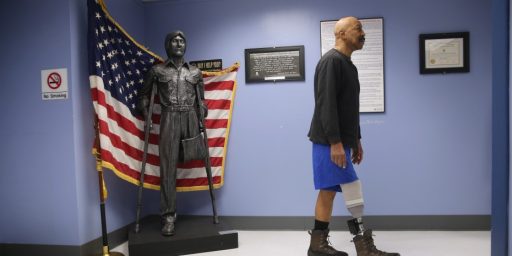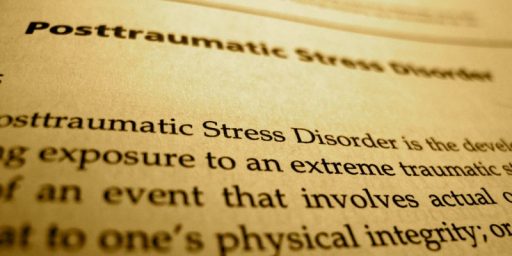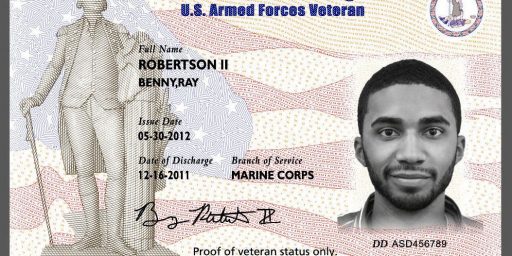On Veterans, Crime, Timing, and “Other Than Honorable” Discharges
For veterans who get in trouble with the law, *when* they commit a crime can have profound implications on their future. Does this make sense?
In the past, James has covered the topic of Veterans Who Aren’t Veterans — veterans who, because they were convicted of a crime while enlisted, received an “Other Than Honorable” discharge. These individuals are ineligible for the health care, employment, housing and education benefits offered by the Department of Veterans Affairs. As James noted at the time, while its easy to think of these individuals as criminals deserving of what they get, the fact is that for some significant percentage, their crimes (which can include things like DUI) most likely have ties to PTSD resulting from their involvement in military actions.
This week, NPR carried a must-listen series of reports on this topic, reported by Quil Lawrence. In particular, the report that aired Wednesday morning truly brought the complexities, or rather absurdities, of the “bad paper” situation into perspective.
In Wednesday’s report, Lawrence explored the emergent phenomenon of “Veterans Treatment Courts” — institutions that offer veterans charged with crimes probation, with the condition of supervised treatment, instead of jail time. There are now over 130 such courts across the US. Lawrence points out in the report that the popularity for these courts stems in part from the fact that the VA covers the treatment of the veterans who participate in the program.
There is little question that these progressive treatment programs are a good idea. But, when one takes a step back, the preferential treatment for troubled veterans, with “honorable” discharges, points to a larger issue with how PTSD related crime is treated:
LAWRENCE: [Detroit Judge David Jordan] says judges are setting up vets courts because they should, but also because they can. VA benefits can fund all the treatment that the courts order, so these courts cost very little to the communities that start them. The VA doesn’t pay for treatment of vets with a less than honorable discharge.
There’s another important point when the crime is committed, while you’re still in the military or once you’re out. Tom White runs a veterans legal clinic in Chicago. He’s an Iraq vet and has taught law at West Point. He says if you go to war, come home, get out with an honorable discharge and then get in trouble, plenty of resources are available.
TOM WHITE: On the other hand, an individual who is not out of the military, maybe a month before they get out and they get a DUI and the command come down on you like a ton of bricks. Justice is typically served cold and hard.
[…]
LAWRENCE: [V]eterans like Chris, the Marine in prison in Virginia, wonder if every crime should carry a life sentence.
CHRIS: I don’t want this anymore in my life. I want to come full circle and I want to eventually come fully home from my war and, you know, live a normal, productive life.
LAWRENCE: Chris came very close to getting a bad discharge himself. If his trial for the DUI had taken place just a few weeks earlier, he would’ve still been in the Marines. He could’ve lost all his benefits. He says veterans lives shouldn’t turn on luck like that or on the mistakes a young man makes when he’s just home from war.
[Note: “Chris” had not benefited from a Veterans court, but was being housed in a Veteran’s wing in the prison. If Chris had received a “Other than Honorable” discharge, he would not have been eligible for the special housing and related treatment programs. – MB]
Lawrence’s report demonstrates a fundamental absurdity with the current system: timing, rather than the crime, can make the difference between whether an individual has access to subsidized VA treatment or if they are cut off from the system all together.
The very PTSD-related crime that a veteran can get subsidized treatment for via a Veteran Court, can, if that individual is still on active duty, ensure that said individual is cut off from any form of subsidized treatment.
To be fair, there are mechanisms for a veteran with “bad paper” to petition the VA for a review of their status. Given enough time, effort, and luck, it is possible for an individual with a “less than honorable” discharge to receive some benefits. However, there is no guarantee.
Without a doubt, we’ve come a long way from the time in which extreme cases of PTSD were treated with radical “cures” like lobotomies. That said, given the mounting evidence of the relationship between PTSD and certain recurrent crimes like DWI/DUI, one has to wonder if the current system, in which *when* you commit a crime can mean the difference between preferential treatment or becoming a pariah is serving either veterans or society as a whole.







Without taking anything away from your many valid points, I feel obligated to point out a few things.
First, the plural form of “anecdote” isn’t “data.” You can always find a sob story given enough people, and there are millions of veterans alive today. You’re bound to find some, or even many, stories that will tear your heart out. That doesn’t mean the system is broken and Must. Be. Changed. Right. Now.
The second point I would make is that regardless of how the citizens of the United States feel about the subject, those of us who are serving and have served in the military hold ourselves to a higher standard. People may laugh and denigrate our approach to honor and service, but that just doesn’t matter. With the exception of about a decade during the Vietnam era, accountability and responsibility has been the norm for military folk. We expect the punishment to exceed that given to a civilian for a similar act, because we hold ourselves to a higher standard.
I sympathize, deeply, with those who have served well, generally, in the military, and are being punished for a single failure to meet our standards. Sadly, many don’t understand that reality when they join the military, but they are quickly brought up to speed. It’s very tough for those who can’t achieve that standard, no doubt. But I believe that’s a necessary by-product of the standards to which we hold ourselves.
As a side note, I wonder if the factors I mentioned above feed into the “deification” of military folk by civilians that’s discussed so often here at OTB.
Boyd, All fair comments. And I appreciate the idea of holding oneself to higher standards within the military. But I’m curious, what is your perspective on the issue that the VA will fund the treatment of veterans who commit X crime AND at the same time, deny benefits to people who commit the same crime while on active duty. Especially when both crimes can be tied back to the issue of PTSD.
Or, to put it a different way — and to a degree, this gets to a point that I’ve seen James and others state multiple times — why are veterans with honorable discharges treated differently than both (a) other veterans who did the same thing, only with “bad paper” and (b) regular civilians who engage in the same activity?
While it may not make sense to non-military folks, but the fact that the offense happens while on active duty makes a difference. It’s all a part of the “holding ourselves to a higher standard” approach.
I must point out, too, that many civilians hold themselves to a similar standard, so this is not an effort to proclaim superiority for folks in the military. But I think it’s pretty clear to just about anyone that our standards are “above average,” but many civilians’ standards are also “above average.”
@Boyd: You say, “(w)ith the exception of about a decade during the Vietnam era…” Could you be specific? I had the honor of personal attendance in that little fracas in ’66 and ’67. I contend that the highly publicized breakdown in military discipline in the later stages of that war were preceded by some years by a failure on the part of the chain of command. The cynicism and careerism above the rank of 0-3 and E-5 set my teeth on edge then and still gets me red-faced and intolerant. We were led by a$$h@les from the two Presidents on down.
And when you cite dates, try to cite facts as well. Because the numbers of undisciplined EM is (in my ‘umble opinion) as overestimated as the numbers of cynical, worthless lifers is understated.
I agree with Boyd, when you sign on the line and lift your hand you are inherently placing yourself on a higher level of accountability than the average civilian, also you are agreeing to a more stringent legal system UCMJ with the potential for double jeopardy as far as litigation goes. The uniformed services judicial system, however, is not unfair. Limited (minor) infractions and adjudication of same is straight forward and equable to the deed. If you are discharged OTH it is usually for criminal behavior and may include a prison sentence. If your criminal behavior is committed after discharge (if honorable) you are under the jurisdiction of civil authorities, but still have access to VA facilities.
While I too agree with Boyd I think one must consider the difference between those who served in the past 10 years and those who, like me, served post Vietnam but prior to 2000.
The fact is we haven’t exposed our service members to the kind of long term sustained combat operations that more recent veterans experienced since Vietnam. I like to think I served honorably for 5 years during the 80’s but I know my experience can’t compare with my nephew who spent a little over a year in a state of near constant combat in Iraq. If we all agree that PTSD in the modern military era is real, and I think there can be no doubt it is, we should consider re-thinking how we deal with the veterans we’ve created and the problems they face.
We, collectively, created this situation. In doing so we lowered our standards for enlistment in an attempt to meet the need. It’s a mess, to be sure. But it’s a mess we as a nation created. I don’t know how we should deal with it. I’m not sure just how much of a break we should give veterans who step outside the line either while on duty or after their service. But I tend to believe they do deserve a break.
I fear however that just as our judgement was tragically flawed when we made the decision to create this situation it may be no better in dealing with the aftermath.
Offered for thought: Sweden closes four prisons as number of inmates plummets
Maybe the problem is not when a veteran commits a crime, but rather how we as a nation approach the problem of crime to begin with?
@JohnMcC: Mr Boyd? Calling Mr Boyd! Some citations? Something like proof that Vietnam veterans were/are uniquely undisciplined and unworthy?
Hey — in ’68, I was hearing from the VFW guys that we didn’t deserve to join their exclusive club because we looked like hippies and — after all — they won their war.
Now all these years later I hear it from you.
Stand up like a man, jerk!
@Boyd: What a load a sanctimonious bull. I’m pretty sure the laughing and denigrating you’ve heard was a reaction to the stench of your self-righteousness. This is about treating soldiers (marines, sailors, and airmen) who have received psychological injuries from their service. Holding someone to a higher standard doesn’t fix their damaged psyche anymore than it regrow lost limbs. I’m not sure why ensuring that veterans are treated for their combat injuries regardless of their separation status will bring the military crashing down.
Interesting points all. And, admittedly, I didn’t serve, so I’m not qualified to talk about the culture or the notion of a “higher standard.”
I think I should also be clear that I don’t think every individual with bad paper deserves special treatment.
However, to @Davebo’s point, the issue of PTSD from wars complicates this entire issue — especially given the well documented rise in drug and alcohol abuse among service members that corresponds to our involvement in the War on Terror.
It just seems to me that the current system is failing a seemingly not-insignificant portion of active service members. And it just strikes me as problematic that the same system provides so many benefits for the same issues, provided the service member can keep it together long enough so they crash once they have left active duty.
Greetings:
As a dyed in the wool, mother’s milk Progressive, if there’s one thing I hate worse than standards, it’s consequences. Forward !!!
Greetings:
One more bit of tid, if you please. A while back, I read a book by a David Finkel about his great Iraq War embeddedment adventure. In his book, Mr. Finkel wrote that, at that time, 15% of the miraculous all-volunteer military enlistees required criminal justice waivers.
@11B40: Your so right, would have made my job as an infantry medic easier. You get wounded, it’s your own fault, you’ll just have to deal with the consequences on your own.
@Davebo: Let’s not draw the conclusion that because someone got an enlistment waiver for a criminal offense that they tend to commit crimes while on active duty. You could just as easily say that those who got a waiver were more likely to not to commit a crime while on active duty b/c they learned their lesson. Does anyone know the recidivism rate?
@JohnMcC: Paging Mr Boyd!